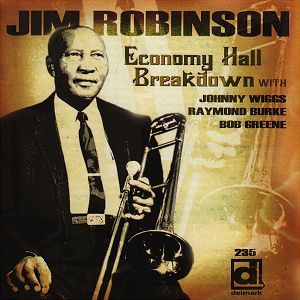1. Economy Hall Breakdown
2. 2.19 Blues
3. Right Now Is The Right Time
4. St. Peter Street Breakdown
5. Atlanta Blues
6. Put On You Old Grey Bonnet
7. Bye And Bye
8. Postman's Lament
9. Stompin' For Sonny
10. Bucktown Shuffle
11. Economy Hall Breakdown (alternate take)
12. Postman's Lament (alternate take)
Jim Robinson – Trombone, vocals (track 7)
Johnny Wiggs - Cornet
Raymond Burke - Clarinet
Bob Greene - Piano
Allan Jaffe - Tuba
Yoichi Kimura – Drums.
"Big"
Jim Robinson was a legend of New Orleans jazz,
famed for his playing with the likes of George
Lewis, Bunk Johnson and Percy Humphrey. From
1960 until his death in 1976, he was a fixture
at the famous Preservation Hall in New Orleans,
where this album was recorded in 1965.
Jim
Robinson was a big man with a big trombone
tone to match. Like many of his colleagues,
he was a forceful rather than subtle player,
but this album captures the authentic atmosphere
of New Orleans and its jazz roots. A track
like 2.19 Blues conveys the conviction
of Jim's playing, with typical glissandi and
punchy contributions to the ensemble. In fact
some of the subtlest playing comes from clarinettist
Raymond Burke, whose solos have the emotional
appeal of George Lewis. Cornettist Johnny
Wiggs plays the lead role well, although his
rather pinched tone lacks the warmth of his
idol, Bix Beiderbecke.
Pianist
Bob Greene contributes some neat solos but
is swamped by the rest of the band in ensemble
passages. The proprietor of Preservation Hall,
Allan Jaffe, makes his recording debut on
tuba, and Japanese drummer Yoichi Kimura thrusts
the band along with his traditional-style
playing: full of rolls and woodblock punctuations.
At
a time when we have been made aware of the
threat to the tradition which New Orleans
represents, this CD illustrates the music
which New Orleans originated and still keeps
alive. If you're wondering about the origin
of the album title, it refers to a dance hall
in New Orleans which was the headquarters
of the Economy and Mutual Aid Association.
It was dismantled shortly before this recording
was made.
Tony
Augarde
